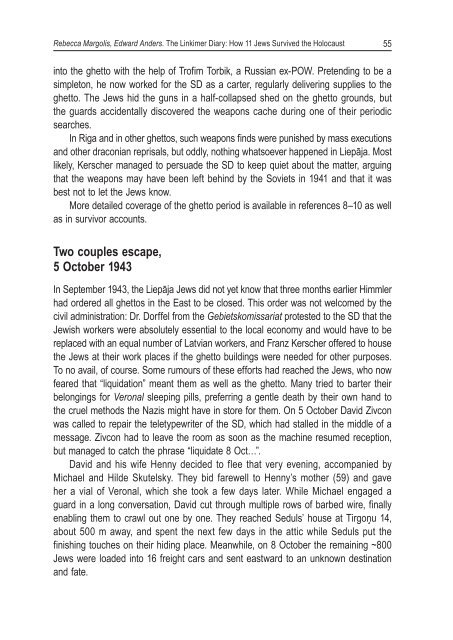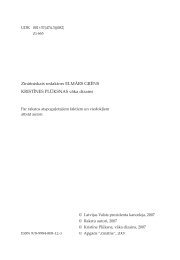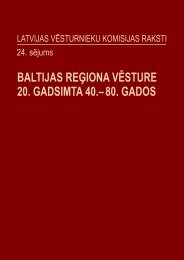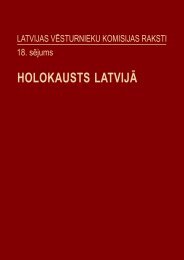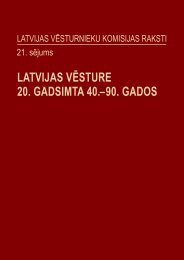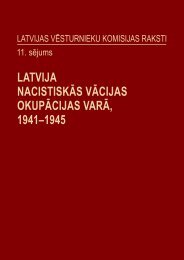- Page 1:
LATVIJAS VĒSTURNIEKU KOMISIJAS RAK
- Page 4 and 5:
Latvijas Vēsturnieku komisija Latv
- Page 6 and 7: SATURS Priekšvārds . . . . . . .
- Page 8 and 9: Saturs Aigars Urtāns Holocaust in
- Page 10 and 11: PRIEKŠVĀRDS Klajā nāk Latvijas
- Page 12 and 13: Pieminot profesora Raula Hilberga i
- Page 14 and 15: Ievada vietā. Pieminot profesora R
- Page 16 and 17: Ievada vietā. Pieminot profesora R
- Page 18 and 19: Ievada vietā. Pieminot profesora R
- Page 20 and 21: PĒTĪJUMI PAR HOLOKAUSTA PROBLĒM
- Page 22 and 23: Aivars Stranga Holokausts vācu oku
- Page 24 and 25: Aivars Stranga. Holokausts vācu ok
- Page 26 and 27: Aivars Stranga. Holokausts vācu ok
- Page 28 and 29: Aivars Stranga. Holokausts vācu ok
- Page 30 and 31: Aivars Stranga. Holokausts vācu ok
- Page 32 and 33: Andrievs Ezergailis. Štālekera zi
- Page 34 and 35: Andrievs Ezergailis. Štālekera zi
- Page 36 and 37: Andrievs Ezergailis. Štālekera zi
- Page 38 and 39: Andrievs Ezergailis. Štālekera zi
- Page 40 and 41: Andrievs Ezergailis. Štālekera zi
- Page 42 and 43: Andrievs Ezergailis. Štālekera zi
- Page 44 and 45: Andrievs Ezergailis. Štālekera zi
- Page 46 and 47: Andrievs Ezergailis. Štālekera zi
- Page 48 and 49: Andrievs Ezergailis. Štālekera zi
- Page 50 and 51: Rebecca Margolis, Edward Anders. Th
- Page 52 and 53: Rebecca Margolis, Edward Anders. Th
- Page 54 and 55: Rebecca Margolis, Edward Anders. Th
- Page 58 and 59: Rebecca Margolis, Edward Anders. Th
- Page 60 and 61: Rebecca Margolis, Edward Anders. Th
- Page 62 and 63: Rebecca Margolis, Edward Anders. Th
- Page 64 and 65: Rebecca Margolis, Edward Anders. Th
- Page 66 and 67: Rebecca Margolis, Edward Anders. Th
- Page 68 and 69: Rebecca Margolis, Edward Anders. Th
- Page 70 and 71: Rebecca Margolis, Edward Anders. Th
- Page 72 and 73: Rebecca Margolis, Edward Anders. Th
- Page 74 and 75: Aigars Urtāns. Holokausts Latvijas
- Page 76 and 77: Aigars Urtāns. Holokausts Latvijas
- Page 78 and 79: Aigars Urtāns. Holokausts Latvijas
- Page 80 and 81: Aigars Urtāns. Holokausts Latvijas
- Page 82 and 83: Aigars Urtāns. Holokausts Latvijas
- Page 84 and 85: Aigars Urtāns. Holokausts Latvijas
- Page 86 and 87: Aigars Urtāns. Holokausts Latvijas
- Page 88 and 89: Aigars Urtāns. Holokausts Latvijas
- Page 90 and 91: Aigars Urtāns. Holokausts Latvijas
- Page 92 and 93: Aigars Urtāns. Holokausts Latvijas
- Page 94 and 95: Aigars Urtāns. Holokausts Latvijas
- Page 96 and 97: Aigars Urtāns Ebreju slepkavošana
- Page 98 and 99: Aigars Urtāns. Ebreju slepkavošan
- Page 100 and 101: Aigars Urtāns. Ebreju slepkavošan
- Page 102 and 103: Aigars Urtāns. Ebreju slepkavošan
- Page 104 and 105: Aigars Urtāns. Ebreju slepkavošan
- Page 106 and 107:
Aigars Urtāns. Ebreju slepkavošan
- Page 108 and 109:
Aigars Urtāns. Ebreju slepkavošan
- Page 110 and 111:
Aigars Urtāns. Ebreju slepkavošan
- Page 112 and 113:
Aigars Urtāns. Ebreju slepkavošan
- Page 114 and 115:
Aigars Urtāns. Ebreju slepkavošan
- Page 116 and 117:
Aigars Urtāns. Ebreju slepkavošan
- Page 118 and 119:
Aigars Urtāns. Ebreju slepkavošan
- Page 120 and 121:
Aigars Urtāns. Ebreju īpašumu ek
- Page 122 and 123:
Aigars Urtāns. Ebreju īpašumu ek
- Page 124 and 125:
Aigars Urtāns. Ebreju īpašumu ek
- Page 126 and 127:
Aigars Urtāns. Ebreju īpašumu ek
- Page 128 and 129:
Aigars Urtāns. Ebreju īpašumu ek
- Page 130 and 131:
Aigars Urtāns. Ebreju īpašumu ek
- Page 132 and 133:
Aigars Urtāns. Ebreju īpašumu ek
- Page 134 and 135:
Aigars Urtāns. Ebreju īpašumu ek
- Page 136 and 137:
Aigars Urtāns. Ebreju īpašumu ek
- Page 138 and 139:
2007. GADA 6.-7. NOVEMBRA KONFERENC
- Page 140 and 141:
Dr. Matthew Kott* with additional r
- Page 142 and 143:
Dr. Matthew Kott. What Does the Hol
- Page 144 and 145:
Dr. Matthew Kott. What Does the Hol
- Page 146 and 147:
Dr. Matthew Kott. What Does the Hol
- Page 148 and 149:
Dr. Matthew Kott. What Does the Hol
- Page 150 and 151:
Dr. Matthew Kott. What Does the Hol
- Page 152 and 153:
Dr. Matthew Kott. What Does the Hol
- Page 154 and 155:
Dr. Matthew Kott. What Does the Hol
- Page 156 and 157:
Dr. Matthew Kott. What Does the Hol
- Page 158 and 159:
Dr. Matthew Kott. What Does the Hol
- Page 160 and 161:
Dr. Matthew Kott. What Does the Hol
- Page 162 and 163:
Dr. Matthew Kott. What Does the Hol
- Page 164 and 165:
Сергей Новиков. Хол
- Page 166 and 167:
Сергей Новиков. Хол
- Page 168 and 169:
Сергей Новиков. Хол
- Page 170 and 171:
Сергей Новиков. Хол
- Page 172 and 173:
Сергей Новиков. Хол
- Page 174 and 175:
Сергей Новиков. Хол
- Page 176 and 177:
DOKUMENTU PUBLIKĀCIJAS PUBLICATION
- Page 178 and 179:
Gabriels Civjans - alias Gunārs C
- Page 180 and 181:
Gabriels Civjans - alias Gunārs C
- Page 182 and 183:
Gabriels Civjans - alias Gunārs C
- Page 184 and 185:
Gabriels Civjans - alias Gunārs C
- Page 186 and 187:
Gabriels Civjans - alias Gunārs C
- Page 188 and 189:
Ebreju darbaspēka izmantošana Rī
- Page 190 and 191:
Ebreju darbaspēka izmantošana Rī
- Page 192 and 193:
Ebreju darbaspēka izmantošana Rī
- Page 194 and 195:
Ebreju darbaspēka izmantošana Rī
- Page 196 and 197:
Ebreju darbaspēka izmantošana Rī
- Page 198 and 199:
Ebreju darbaspēka izmantošana Rī
- Page 200 and 201:
Ebreju darbaspēka izmantošana Rī
- Page 202 and 203:
Ebreju darbaspēka izmantošana Rī
- Page 204 and 205:
Ebreju darbaspēka izmantošana Rī
- Page 206 and 207:
Ebreju darbaspēka izmantošana Rī
- Page 208 and 209:
Ebreju darbaspēka izmantošana Rī
- Page 210 and 211:
Ebreju darbaspēka izmantošana Rī
- Page 212 and 213:
NOVADPĒTNIEKU VĀKUMS COMPILATION
- Page 214 and 215:
Josifs Ročko No Daugavpils holokau
- Page 216 and 217:
Josifs Ročko. No Daugavpils holoka
- Page 218 and 219:
Josifs Ročko. No Daugavpils holoka
- Page 220 and 221:
Josifs Ročko. No Daugavpils holoka
- Page 222 and 223:
Josifs Ročko. No Daugavpils holoka
- Page 224 and 225:
Josifs Ročko. No Daugavpils holoka
- Page 226 and 227:
Josifs Ročko. No Daugavpils holoka
- Page 228 and 229:
Josifs Ročko. No Daugavpils holoka
- Page 230 and 231:
Josifs Ročko. No Daugavpils holoka
- Page 232 and 233:
Josifs Ročko. No Daugavpils holoka
- Page 234 and 235:
Josifs Ročko. No Daugavpils holoka
- Page 236 and 237:
Josifs Ročko. No Daugavpils holoka
- Page 238 and 239:
Josifs Ročko. No Daugavpils holoka
- Page 240 and 241:
Josifs Ročko. No Daugavpils holoka
- Page 242 and 243:
Josifs Ročko. Tas notika Preiļos
- Page 244 and 245:
Josifs Ročko. Tas notika Preiļos
- Page 246 and 247:
Josifs Ročko. Tas notika Preiļos
- Page 248 and 249:
Josifs Ročko. Tas notika Preiļos
- Page 250 and 251:
Josifs Ročko. Tas notika Preiļos
- Page 252 and 253:
Josifs Ročko. Tas notika Preiļos
- Page 254 and 255:
Josifs Ročko. Tas notika Preiļos
- Page 256 and 257:
Josifs Ročko. Tas notika Preiļos
- Page 258 and 259:
Josifs Ročko. Tas notika Preiļos
- Page 260 and 261:
Josifs Ročko. Tas notika Preiļos
- Page 262 and 263:
Uldis Lasmanis. Holokausts Jēkabpi
- Page 264 and 265:
Uldis Lasmanis. Holokausts Jēkabpi
- Page 266 and 267:
Uldis Lasmanis. Holokausts Jēkabpi
- Page 268 and 269:
Uldis Lasmanis. Holokausts Jēkabpi
- Page 270 and 271:
Uldis Lasmanis. Holokausts Jēkabpi
- Page 272 and 273:
Uldis Lasmanis. Holokausts Jēkabpi
- Page 274 and 275:
Uldis Lasmanis. Holokausts Jēkabpi
- Page 276 and 277:
Uldis Lasmanis. Holokausts Jēkabpi
- Page 278 and 279:
Uldis Lasmanis. Holokausts Jēkabpi
- Page 280 and 281:
Uldis Lasmanis. Holokausts Jēkabpi
- Page 282 and 283:
Uldis Lasmanis. Holokausts Jēkabpi
- Page 284 and 285:
Uldis Lasmanis. Holokausts Jēkabpi
- Page 286 and 287:
Uldis Lasmanis. Holokausts Jēkabpi
- Page 288 and 289:
Uldis Lasmanis Holokausta upuri un
- Page 290 and 291:
Uldis Lasmanis. Holokausta upuri un
- Page 292 and 293:
Uldis Lasmanis. Holokausta upuri un
- Page 294 and 295:
Uldis Lasmanis. Holokausta upuri un
- Page 296 and 297:
Uldis Lasmanis. Holokausta upuri un
- Page 298 and 299:
Uldis Lasmanis. Holokausta upuri un
- Page 300 and 301:
Uldis Lasmanis. Holokausta upuri un
- Page 302 and 303:
Uldis Lasmanis. Holokausta upuri un
- Page 304 and 305:
Uldis Lasmanis. Holokausta upuri un
- Page 306 and 307:
Uldis Lasmanis. Holokausta upuri un
- Page 308 and 309:
Uldis Lasmanis. Holokausta upuri un
- Page 310 and 311:
Uldis Lasmanis. Holokausta upuri un
- Page 312 and 313:
Uldis Lasmanis. Holokausta upuri un
- Page 314 and 315:
Uldis Lasmanis. Holokausta upuri un
- Page 316 and 317:
Uldis Lasmanis. Holokausta upuri un
- Page 318 and 319:
Uldis Lasmanis. Holokausta upuri un
- Page 320 and 321:
Uldis Lasmanis. Holokausta upuri un
- Page 322 and 323:
Uldis Lasmanis. Holokausta upuri un
- Page 324 and 325:
Uldis Lasmanis. Holokausta upuri un
- Page 326 and 327:
Uldis Lasmanis. Holokausta upuri un
- Page 328 and 329:
Uldis Lasmanis. Holokausta upuri un
- Page 330 and 331:
ATMIŅAS MEMORIES 329
- Page 332 and 333:
Jānis Britāns Liecinieku vairs na
- Page 334 and 335:
Jānis Britāns. Liecinieku vairs n
- Page 336 and 337:
Jānis Britāns. Liecinieku vairs n
- Page 338 and 339:
Jānis Britāns. Liecinieku vairs n
- Page 340 and 341:
Jānis Britāns. Liecinieku vairs n
- Page 342 and 343:
Atmiņas par Latgales ebreju bēgļ
- Page 344 and 345:
Atmiņas par Latgales ebreju bēgļ
- Page 346 and 347:
Atmiņas par Latgales ebreju bēgļ
- Page 348 and 349:
Atmiņas par Latgales ebreju bēgļ
- Page 350 and 351:
Atmiņas par Latgales ebreju bēgļ
- Page 352 and 353:
Atmiņas par Latgales ebreju bēgļ
- Page 354 and 355:
Atmiņas par Latgales ebreju bēgļ
- Page 356 and 357:
Atmiņas par Latgales ebreju bēgļ
- Page 358 and 359:
Atmiņas par Latgales ebreju bēgļ
- Page 360 and 361:
Atmiņas par Latgales ebreju bēgļ
- Page 362 and 363:
Atmiņas par Latgales ebreju bēgļ
- Page 364 and 365:
Atmiņas par Latgales ebreju bēgļ
- Page 366 and 367:
Atmiņas par Latgales ebreju bēgļ
- Page 368 and 369:
Atmiņas par Latgales ebreju bēgļ
- Page 370 and 371:
Atmiņas par Latgales ebreju bēgļ
- Page 372 and 373:
Atmiņas par Latgales ebreju bēgļ
- Page 374 and 375:
Atmiņas par Latgales ebreju bēgļ
- Page 376 and 377:
Krājuma rakstu autori Margoliss, R


